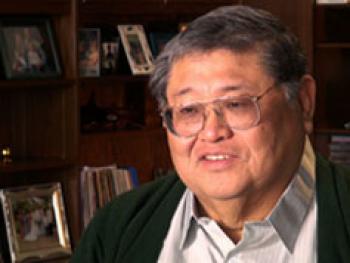Richard Chikami

Tuna Pioneers: San Pedro-Terminal Island, California
In the early 1900's, the West Coast tuna industry was born in the small coastal California town of San Pedro, near Los Angeles. Fishing and canning businesses soon expanded to nearby Terminal Island developing into a multi-million dollar industry. At the heart of it all was a thriving immigrant community. Generations of immigrants primarily from Japan, Croatia, and Italy harvested tuna, supported the bustling fish markets, and worked in the canneries. They explored new fishing grounds and developed novel fishing and preservation methods that influenced the global tuna industry today. Though the large tuna fleet and canneries are now gone from the area, many of those who were involved still reside there. The interviews in this collection were conducted as part of an effort to create a short film about this history.
Richard was born in San Pedro in 1946; a third generation Japanese-American (sansei). In this interview, he recounts how his family came to be living in San Pedro from Japan, and the challenges they faced because of "yellow exclusion laws" and other discriminatory practices that prevented his grandparents from becoming U.S. citizens. His grandfather settled initially in a Japanese fishing community near Santa Monica, California where he ran a fish market. However, he was not legally allowed to hold a business license until 1954 when he was allowed to become a U.S. citizen. Richard describes the forced removal of the Japanese-American community from Terminal Island with only 48 hours of notice at the outset of World War II and the devastating impact the relocation had on their fishing community. Chikami represents the third generation of his family's involvement in the fishing industry of the San Pedro/Terminal Island area. His fishing experience spans the post war era when bait boats converted to purse seining and when super-seiners ventured forth from California to develop new fishing grounds in Africa and the far reaches of the Pacific. Richard had a highly successful career, starting as a quarter-share crewman, advancing to Chief Engineer, to owning and operating his own vessel. Richard's close relatives included some of the few Japanese American families that returned to owning and operating tuna boats out of San Pedro/Terminal Island following WWII, after having been displaced from their homes and the fishery by wartime internment. With his uncles George and Ben Fukuzaki, he helped to pioneer the New Zealand and western Pacific tuna fishery on the Jeanette C and M/V Western Pacific.
In the early 1900's, the West Coast tuna industry was born in the small coastal California town of San Pedro, near Los Angeles. Fishing and canning businesses soon expanded to nearby Terminal Island developing into a multi-million dollar industry. At the heart of it all was a thriving immigrant community. Generations of immigrants primarily from Japan, Croatia, and Italy harvested tuna, supported the bustling fish markets, and worked in the canneries. They explored new fishing grounds and developed novel fishing and preservation methods that influenced the global tuna industry today. Though the large tuna fleet and canneries are now gone from the area, many of those who were involved still reside there. The interviews in this collection were conducted as part of an effort to create a short film about this history. To find out more and view additional footage, visit: http://www.westcoast.fisheries.noaa.gov/fisheries/migratory_species/voices_from_the _fisheries.html
Please Note: The oral histories in this collection are protected by copyright and have been created for educational, research and personal use as described by the Fair Use Doctrine in the U.S. Copyright law. Please reach out Voices@noaa.gov to let us know how these interviews are being used in your research, project, exhibit, etc. The Voices staff can help provide other useful resources related to your inquiry.
The NOAA mission is to understand and predict changes in climate, weather, oceans, and coasts, to share that knowledge and information with others, and to conserve and manage coastal and marine ecosystems and resources. The Voices Oral History Archives offers public access to a wide range of accounts, including historical materials that are products of their particular times, and may contain offensive language or negative stereotypes.
Voices Oral History Archives does not verify the accuracy of materials submitted to us. The opinions expressed in the interviews are those of the interviewee only. The interviews here have been made available to the public only after the interviewer has confirmed that they have obtained consent.
